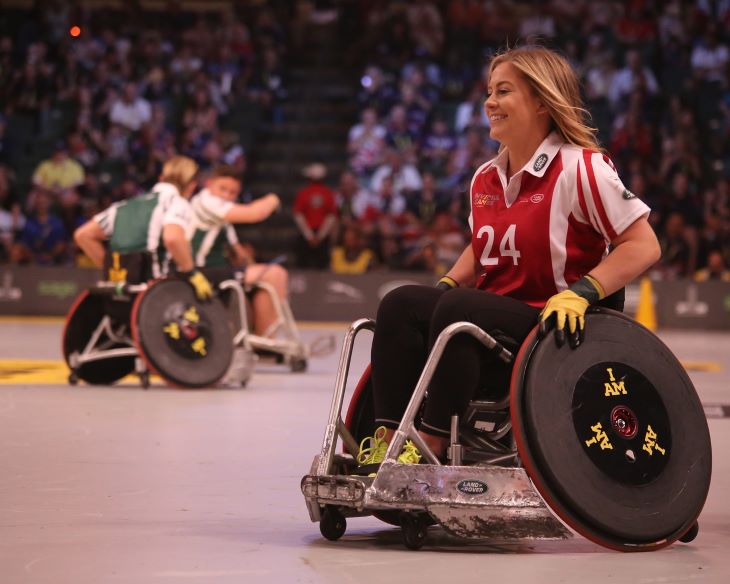Alcohol misuse among those who live with physical and psychological disabilities is an unfortunately prevalent issue [1].
The relationship between alcohol misuse and disability is a complicated one thanks to the variety of reasons for why these individuals are vulnerable to developing the condition.
There are unique challenges we face when tackling the issue of alcoholism and the disabled, and it’s important to discuss the root causes and complications involved.
Alcoholism and the disabled

Alcoholism is an incredibly complex condition. It can develop as a result of several interlinking risk factors being triggered, and so there is no set list of reasons why the rates among disabled people are so high.
However, there are several factors that contribute to this fact and are common amongst those who live with a disability.
Coping mechanism
Disabilities can vary in how much physical pain or discomfort they create for an individual. Some can be quite easily sedated, whereas others can trigger chronic pain which lingers for an excruciating period of time.
In a similar way, disabilities can create problems that, while not necessarily physical, have a resounding impact on the way individuals live their lives. For example, while an amputation may not cause pain, it can cause frustration when it comes to limited mobility.
It is common for individuals to want to combat these obstacles with the use of alcohol. It is a substance that creates a pleasant high when consumed, and so individuals can see it as an effective way of self-medicating for physical or psychological pain.
However, this consumption can quickly get out of hand as frequent alcohol use is known to lead to physical and psychological dependency.
At OK Rehab, we offer free advice from a team of non-judgemental professionals, many of whom are in recovery and understand how hard it can be to change your relationship with addiction.
To find out more about alcoholism and the disabled, simply reach out to our 24/7, confidential hotline on 0800 326 5559.
Expression and fun

When an individual’s life is limited by a disability, they can sometimes be restricted in how they spend their recreational time. Sport, exercise, and travel can be inaccessible to them, so the options for having fun are less than those of other people.
Alcohol is a substance commonly used for fun and letting off steam. People drink it to forget their problems and to have a good time with friends, and this is no different for those who are disabled.
However, because of the absence of alternative recreational activities, disabled individuals may be more inclined to see alcohol as an option for fun and therefore drink it more often.
Not understanding the risks

It is not just those with physical disabilities that experience higher rates of alcoholism. These statistics also apply to those who live with learning disabilities [2].
When individuals face challenges when it comes to understanding the world around them, certain risks and dangers can be overlooked or misunderstood.
Alcohol, therefore, can be consumed without an individual fully understanding the risks that come with its consumption.
Similarly, individuals with learning difficulties can sometimes misread or depend heavily on others when understanding the social dynamics of a certain situation.
If a friend or family members consumes a lot of alcohol, therefore, individuals can see this as normal and do the same. Social pressures and learned behaviour are some of the biggest risk factors when it comes to all cases of alcoholism.
At OK Rehab, we offer free advice from a team of non-judgemental professionals, many of whom are in recovery and understand how hard it can be to change your relationship with addiction.
To find out more about alcoholism and the disabled, simply reach out to our 24/7, confidential hotline on 0800 326 5559.
The impact of alcoholism on disabled individuals

The consequences of alcoholism are vast and varied. It can seriously impact physical and mental health, and the ways in which it can exacerbate a disabled individual’s everyday challenges are numerous.
Alcoholism and the body
Drinking alcohol has a huge impact on the body. In the short-term, the experiences of being drunk and hungover are well-known, but it is the long-term effects that individuals may not be aware of.
Consistent and/or excessive alcohol consumption can cause the following:
- High blood pressure
- Damage to the liver (potentially causing organ failure)
- Weakened immune system
- Increase risk of developing heart conditions
- Increased risk of developing cancers (throat, for example)
- Insomnia and fatigue
On a more day-to-day basis, alcohol creates a dependency that individuals find impossible to break away from. If they try to go sober, they experience withdrawal symptoms which can be incredibly unpleasant and dangerous.
In fact, alcohol is one of the few substances that can kill if withdrawal is not handled correctly. Delirium Tremens, for example, can be triggered by rapid or unsupervised sobriety, potentially causing sudden death.
Alcoholism and the mind

Alcohol is a depressant which means that it interferes with the usual emotional and hormonal rhythms of those who consume it. As a result, frequent use can spark mood swings, spells of irrational behaviour, and depressive episodes.
In addition to these impacts, alcohol use can impact the people around the individual consuming it. Family and friends can experience emotional lows both on account of watching the condition develop and interacting with the afflicted individual.
At OK Rehab, we offer free advice from a team of non-judgemental professionals, many of whom are in recovery and understand how hard it can be to change your relationship with addiction.
To find out more about alcoholism and the disabled, simply reach out to our 24/7, confidential hotline on 0800 326 5559.
Alcoholism and the disabled – treatments

Tackling alcohol dependency is an intricate and careful process. Those who require treatment are advised to enter rehab, widely deemed to be the safest method of overcoming addiction.
Rehab is so successful because of its three fundamental steps. These are detox, therapy, and relapse prevention.
Detox
Alcohol dependency is tackled first via the body and its physical need to consume the substance.
Detox is the process where this consumption is stopped and the body is forced to become sober. Especially with alcohol, this process can be very dangerous (sometimes deadly), so rehab ensures that doctors are on hand to limit the risks to an individual’s health.
A common source of support is the provision of benzodiazepines which are drugs that reduce the effects of withdrawal and make the process more manageable.
Therapy

Following detox, the success of rehab depends on altering the dangerous thought processes and perceptions of alcohol that an individual has. This kind of work looks to prevent relapse occurring when rehab is over.
Therapy is a stage of rehab that can look very different from case to case. It can involve family members, other recovering alcoholics, or even just an individual and their therapist, but the ultimate goal across all forms is the same.
Addictions always form as a result of some underlying trigger, and it is therapy’s job to identify this cause and prepare an individual for handling it in the future. This might involve learning to better handle emotions, thoughts, or social interactions.
Relapse prevention
Once physical and psychological distance from alcohol consumption has been established, the final role of rehab is to prepare an individual for life after treatment.
Relapse prevention is a vital stage of rehab as the events of an individual’s day-to-day life are often responsible for triggering their condition in the first place. Work and home life can be equally challenging.
As a result, it is rehab’s role to help individual anticipate these difficulties and work around them. This might involve trigger avoidance or developing a stronger support network.
Getting support with OK Rehab

If you have a disability and are concerned about your alcohol consumption, or you have concerns about that of someone you care about, don’t hesitate to reach out for help.
Alcoholism is an incredibly dangerous condition, and mishandling its treatment can be equally detrimental to an individual’s health. For these reasons, getting the right kind of support is essential.
At OK Rehab, we understand that getting help can be a daunting process, so don’t hesitate to get in touch and let us help.
At OK Rehab, we offer free advice from a team of non-judgemental professionals, many of whom are in recovery and understand how hard it can be to change your relationship with addiction.
To find out more about alcoholism and the disabled, simply reach out to our 24/7, confidential hotline on 0800 326 5559.
References






